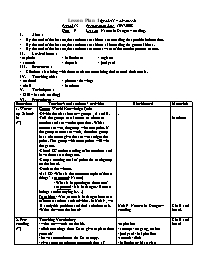Bài soạn môn học Tiếng Anh 11 - Period 73 - Unit: 9 Lesson: Nature in Danger – reading

I. Aims :
- By the end of the lesson, the students are able to scan reading for specific information.
- By the end of the lesson, the students are able to skim reading for general ideas.
- By the end of the lesson, the students are more aware of the need to protect nature.
II. Lexical items :
-explode - hallucinate - register
- summit - deposit - junkyard
III. Structures :
- Climbers also bring with them canisters containing fuel to cook their meals.
IV. Teaching aids:
- textbook - picture / drawings
- chalk - handouts
V. Techniques :
- Skill – based ( reading)
VI. Procedures :
Bạn đang xem tài liệu "Bài soạn môn học Tiếng Anh 11 - Period 73 - Unit: 9 Lesson: Nature in Danger – reading", để tải tài liệu gốc về máy bạn click vào nút DOWNLOAD ở trên
Lesson Plan 1(grade 11 – advanced) Period 73: Preparation date : 10/1/2008 Unit : 9 Lesson : Nature in Danger – reading. Aims : By the end of the lesson, the students are able to scan reading for specific information. By the end of the lesson, the students are able to skim reading for general ideas. By the end of the lesson, the students are more aware of the need to protect nature. Lexical items : -explode - hallucinate - register - summit - deposit - junkyard Structures : Climbers also bring with them canisters containing fuel to cook their meals. Teaching aids: - textbook - picture / drawings - chalk - handouts Techniques : - Skill – based ( reading) Procedures : State/time Teacher’s and students’ activities Blackboard Materials 1. Warm-up & lead-in (7’) Game: World Knowledge Quiz -Divide the class into tow groups , A and B. -Tell the groups to take turns to choose a number and answer the question . With a correct answer, the group wins one point. If the group cannot answer it, the other group has a chance to give the answer and get the point . The group with more points will win the game. -Check SS’ understanding of instructions and have them start the game. -Keep a running total of points for each group on the board. -Declare the winner. -Ask SS: -What is the common topic of these things? ( expected : Nature) - What is happening to the nature? ( expected : It is in danger./ Human beings are destroying it./) Transition: -Yes, nature is in danger because of human actions and activities. In Unit 9 , we ‘ll study this problem and find solutions to it. -Write down on the board: . Unit 9 Nature in Danger – reading handouts Chalk and board. 2. Pre-reading (7’) Teaching Vocabulary - write new words on the bb. - elicit meanings from Sts or give explanations yourself - leave some minutes for Sts to copy. - give some practice on pronunciation ( T reads – Sts repeat in chorally, then asks Sts to read individually.) -explosion - attempt : co gang, no luc - junkyard : bai phe lieu -summit : dinh - hallucinate: bi ao giac -survival: su song sot , ton tai - deposit: tien coc -Read the words one by one and ask SS to repeat Chalk and board 3. while - reading (15’) . Checking Vocabulary: Gap- filling -Give Ss handouts and ask them to complete the sentences using the words just learned. 1.Living in the wild, animals have to struggle for------------ 2.Dave said he would--------- to break the world record this time. 3. A few minutes after taking the drug , he began to --------- 4. You have to pay a $50 ------------ before you can move into the flat. 5. Together with the development of economy , would population------- and reached 6 billion In the twentieth century. 6. Lots people have tried to climb to the ----------of this mountain but not many have reached it. -Tell SS to compare answer in pairs, and then check with the class Activity 2: True – false Statements - Give SS handouts with statements about Mt. Everest and tell them to decide if they are True , False or Not Given according to the text. -Ask SS to work with a partner and compare answers . -Call on SS to read the statements and say their choice -Go over the answers with the class Expected answers: 1.survival 2.attempt 3. hallucinate 4. deposit 5. exploded 6. summit These are the statements in the handout: 1. Tourism in Nepal has increased quickly because lots of people want to visit Mount Everest. 2. The Southeast Ridge is the summit of Mount Everst. 3.Lots of climbers hallucinate because of lack of oxygen. 4. Sherpas are native Himalayan guides or porters in the mountains . 5. According to the new law ,climbers have to pay a $5,000 deposit before leaving the country. Chalk + book + small board Textbooks chalk 4. Post-reading (10’) Discussion -Ask SS to work in groups of 4 or 5 , and discuss the problems in Viet Nam’s national parks and famous tourist attractions , and then suggest solutions to the problems. Textbooks 5. Homework (2’) Summary completing -Give SS handouts of a summary of the reading text and ask them to complete it by using one word in each space. Book and notebook
Tài liệu đính kèm:
 p73.doc
p73.doc





